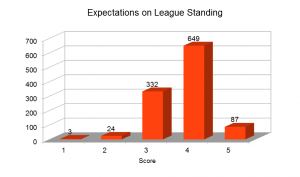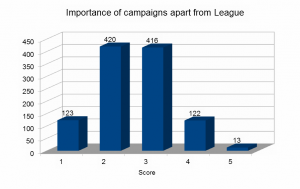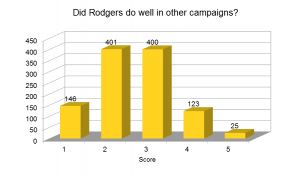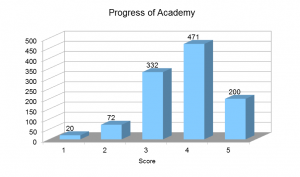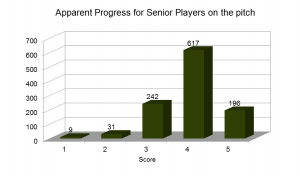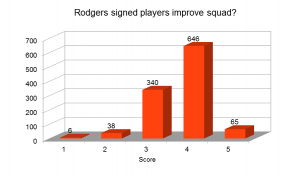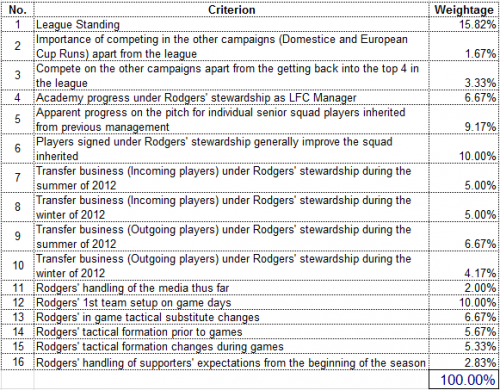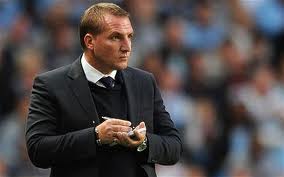By TTT Subscriber Jagdesh Singh.
Why a Rodgers’ Report Card for 2012/2013?
On May 22 we ran a piece on TTT asking people to Fill In Brendan Rodgers’ Report Card for 12/13.
Even before the season ended, Liverpool fans online, ever so vocal on Social Networks, were already hashing out their own individual verdicts on how the season for Brendan Rodgers had fared. Blogs and articles came out steadily from more established writers, offering their analysis on the subject, each coming out with conclusions that were neither here nor there.
“Yes, he’s progressed the squad and club well but the statistics point otherwise. Context is important. Etc.”
There’s even an ongoing debate on how to measure progress, if there was any, against a set of baseline indicators.
There were simply no forgone conclusions except that another season was merited for Rodgers to prove his mettle after ‘laying the foundations’, nor was there an overriding approach on elaborating these thoughts and analysis from each corner of the space that is the internet.
And so perhaps, we thought, it would be a worthwhile exercise to gauge the overall thoughts and feelings of those vocal or non-vocal Liverpool fans, including the esteemed bloggers and writers, within a somewhat objective and measurable survey.
The approach
A set of criteria were chosen, to be measured by scores ranging from 1 to 5, with each criterion given a certain amount of weightage (in percentage) that would ultimately make up 100%. The weightage was intended to differentiate the importance of certain criterion when compared relatively to others.
These criteria and corresponding weightage are:
Questions were derived to solicit the scores for each criterion, and were posted in this survey. We’ve consolidated the scores from a population of 1,096 respondents over a period of three weeks. Quite simply, each score was multiplied with the number of respondents for each question, averaged against the total number of respondents.
Example: an average score of 3687 / 1095 would yield 3.367, which when rounded would give you a rounded averaged score of 3.
When fully summarised, each criterion would have these averaged rounded scores, giving you an idea of how Rodgers fared for each perceived function of his role as the Liverpool Football Club manager, very much like the format for your School Report Card.
It may not be the perfect approach, nor sophisticated enough to capture the imaginations of more skilled statisticians out there, but we think it’s a start. We hope to keep on improving on this model (or even change it) as we continue to try and measure his success rates throughout his tenure as the manager.
The Scores
The first and foremost question that pretty much defines the success of any manager in his first season is: did he meet our expectations in the league? You can’t ask this question without putting the context around it. You simply can’t.
History seems to have consigned Kenny’s second stint as LFC manager as being a failure, although there are many facets that seem to indicate that Kenny did unite the club and in some ways even helped save it. Rodgers took over from a club legend as both player and manager, after the so-called poor 2011/12 season, and also after a very tumultuous period for the club. Hence, the weight of bringing the glories of yesteryears back wasn’t entirely put on his shoulders.
1 – Here’s how the scores turned up for meeting the expectations at the beginning of the season.
With a maximum score of 5 indicating expectations for him to winning the league and a minimum of 1 being the indicator for our expectations to LFC being a the bottom of the league, 59.3 % of respondents gave him a high score of 4 (B) while 30.3% of them gave him a score of 3 (C).
These scores averaged give Rodgers a solid B which seems to imply that most of us thought we’d get 4th at the beginning of the season.
2 – Next was to ask whether he did well in the other campaigns apart from the league. But before that, we needed to understand if it was important to compete in the other campaigns, especially for his first season to set-up up the foundations for future seasons competing in as many campaigns as possible.
With maximum score of 5 indicating that these campaigns are more important than the league and a score of 1 being the indicator that Rodgers should be completely focused on the league itself, 38.4% of respondents gave a score of 2 (D) and another 38% gave a score of 3(C). When totally averaged, the importance of competing in the other campaigns gets a score of 3(C), implying that it would’ve been nice to be involved in all campaigns but not really challenging for any honours. Sorry Joe Pepper, this includes the Europa League (inside joke).
With the importance of competing in the other campaigns being not really important, 36.6% gave a score 2 (D) and equally another 36.5% gave a score of 3 (C), with a score of 5 indicating he did very well in competing in all campaigns and a score 1 indicating he did badly. Total average score for this question is 3 (C). This probably means he did well with the resources he was disposed with.
3 – Did the Academy progress well under Rodgers’ stewardship as LFC Manager? With a score of 5 indicating stark differences from his predecessor’s stewardship, and a score of 1 indicating no apparent progress whatsoever, Rodgers’ scored a 4 (B) with a whopping 43% of the respondents voting for it. The names Sterling and Shelvey were the embodiment of this perceived progress under his tutelage.
So, he did well with the young ones in the Academy.
4 – How did he fare in improving his senior squad players that he had inherited from previous managements? He took over Kenny’s best of Britain but Rafa’s players were still around. None of Hodgson’s was, thankfully.
With a maximum of 5 indicating vastly improved performances and a 1 indicating regressed performances for the players as whole, 56.4% voted a score of 4 (B) which is also the average score. Non-fan favourites that never made the grade in the previous season, like Enrique, Henderson and even Downing all displayed apparent improved performances under Rodgers’ stewardship.
5 – And now we move on to the players that Rodgers got in his first season. Did the players signed under his stewardship, albeit without a proper Transfer Committee in place at the time, generally improve the squad?
With a score of 5 indicating that all the players he signed improved the squad, and a score of 1 the opposite, a healthy majority (59%) gave a score of 4 (B). The jury is still out on Allen and Borini but they haven’t been deemed failures as yet. Both Coutinho and Sturridge have demonstrated astute signings that bolstered the squad well in the second half of the season.
Although we’re far away from the days where Rafa had to sell in order to buy, thus making a sale and a buy as economically viable and justifiable as possible, it would’ve been useful to also understand how Rodgers did in his transfer market dealings. These indicators wouldn’t have necessarily been deal breakers for Rodgers but a £35 million signing of a certain striker may have helped get another manager the sack before.
Rodgers was rated with a score of 2 (D) for the business of incoming players during the summer of 2012.
He was rated with a score of a perfect 5 (A) for the business of incoming players during the winter of 2012.
His score for business on outgoing players during the summer of 2012 was an average 3 (C).
And finally, his score for business on outgoing players during the winter of 2012 was a solid 4 (B).
In summary, he did alright in shipping out players deemed not good enough for the squad and our objectives during both summer and winter, did horribly badly in buying players during the summer and did extremely well buying players during the winter.
6 – Now comes the part in trying to understand how Rodgers did in managing the team during game day. How did Rodgers set his teams up before the games started each time we play?
For his formations and tactics, a simple majority of respondents (50%) gave him a 3 (C), which means he was neither spot on all the time nor wrong all the time. His choice of personnel to suit these initial formations and tactics prior to the game was better scored, a 4 (B), meaning although he never got the tactics right all the time but his team was set-up right according the chosen tactics and formation.
But what about his in-game management, where decisions have to be made to accommodate the fluidity of how the game progresses?
Rodgers scored a 3 (C), for changing his tactics and formation halfway through the game (or at any point during the game), which means he may have seemed pedantic and lacked that elusive Plan B. But this wasn’t all the time, which did present itself more during the second half of the season.
And the personnel deployed for these tactical changes were also scored a 3 (C), neither spot on nor wrong all the time. Perhaps the bench wasn’t strong enough to present him with that game-changing factor.
7 – And finally, the other vital part of being an LFC manager would be how he manages the supporters and the media. This isn’t typically something that is scrutinised or measured for most of the other clubs in England, but as Rodgers found out very early in his tenure, the magnifying glass on the skills required for these criterion is pretty intrusive.
Encouragingly, Rodgers scored a solid 4 (B) for managing the global club’s supporters, closer to good rather than bad. This does point out that he did pick up skills on being savvy yet unpatronising to the vast majority of the supporters.
On the flipside, Rodgers also did well managing the media, scoring another 4 (B) which might very well be as good as how Hodgson did (or rather the media managed Hodgson favourably).
His Overall Grade
When summed together, the weighted scores finally gave Rodgers a score of 3.7 for the season, which is pretty much a good B, which we think is a fair judgement for a young new manager still finding his way around one of the biggest clubs in the world.
B plus? Could do better?
